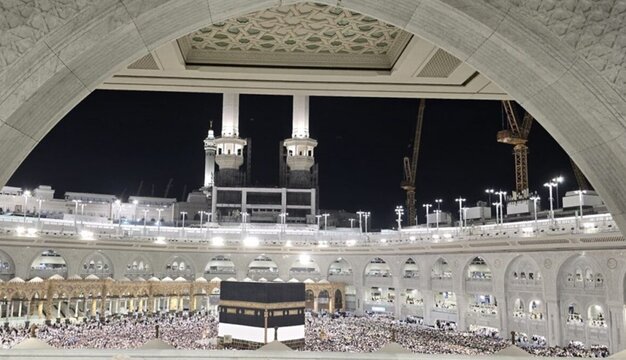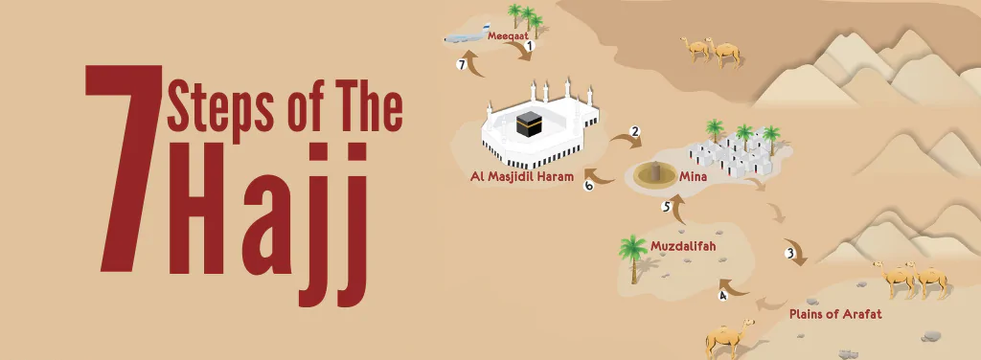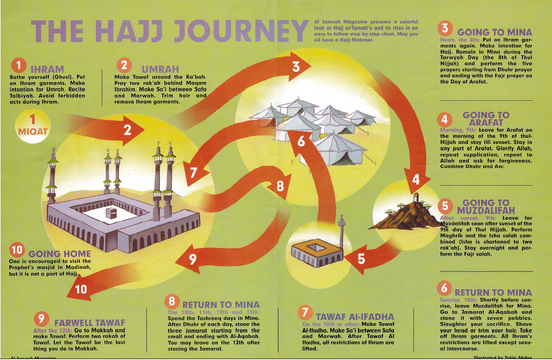11-03-2024
5,166
218
289

When is Hajj 2025?
Rituals of Hajj 2025 will commence from the evening of Friday, 14th of June 2025, and will continue till the evening of Wednesday, 19th June, 2025. This is the tentative date as the actual date is contingent on the sighting of the moon of Dhul Hijjah, 1446, the 12th and last month of Islamic Calendar.
What is Hajj?
“And complete the Hajj and Umrah for Allah.”
(Surah Al-Baqarah 2:196)
Learn about “Step by Step Umrah Guide”
Hajj (حَجّ) is an Arabic word which means ‘Aim’ or ‘Destination’ or ‘Purpose’. Hajj is the ultimate journey to the House of Allah (Kaaba).
Hajj is one of the five pillars of Islam. Hajj is a duty on every adult, sane, free Muslim who is capable of performing it once in a lifetime. A capable person is the one who can afford the trip both financially and health-wise.
This obligation of Hajj is also evident from the following Hadith:
'Prophet (S.A.W.) addressed his companions and said: “O people, Allah has made Hajj obligatory for you; so perform Hajj.”'
(Sahih Muslim: 1337)
Hajj rituals are performed between the 8th and 13th day of the month of Dhul Hijjah.
Benefits of Hajj
Hajj involves travel and it requires more effort than other kinds of worship. This is the reason that Allah Has only made it mandatory for His servants to perform it only once in a lifetime with the stipulation that one must be able to do it both financially and physically. The benefits and hidden wisdom of Hajj are many and some of these (according to Hadith) are given below:
1- Hajj is one of the Five Pillars of Islam
Messenger of Allah (S.A.W.) said:
“Islam is based on five (principles) and performing Hajj is one of them.”
(Sahih Bukhari: 8)
Since Hajj is one of the five pillars of Islam, only this fact indicates its importance and it also shows how much Allah loves it.
2- All Previous Sins will be forgiven
As narrated by Abu Hurairah (R.A.), Prophet (S.A.W.) said:
“Whoever performs Hajj for Allah's pleasure and does not have sexual relations with his wife, and does not do evil or sins then he will return (after Hajj free from all sins) as if he were born anew.”
(Sahih Bukhari: 1521)
According to the Hadith, if Hajj is performed according to Sunnah and just to please Allah then it will purify all the sins and pilgrims will become sinless as a newborn child.
3- Paradise is the Reward
Narrated by Abu Hurairah (R.A.) that Prophet (S.A.W.) said:
"And the reward of Hajj Mabrur (the one accepted by Allah) is nothing except Paradise."
(Sahih Bukhari: 1773)
Hadith is self-explanatory and clearly states that if Hajj is performed with the right intention and according to Sunnah, then Allah will definitely accept the Hajj, and the reward of Hajj accepted by Allah is nothing but Jannah (Paradise).
4- Pilgrims of Hajj are Guests of Allah
In Islam, guests are treated with utmost respect, love and dignity. This fact is also evident from the following Hadith:
“Whoever believes in Allah and the Last Day, should serve his guest generously.”
(Sahih Bukhari: 6135)
In this hadith, Prophet (S.A.W.) has directed us that how we should treat our guests. Then just think about how the guest will be treated when hosted by Allah, The Creator of All Worlds.
Following hadith clearly shows that Pilgrims of Hajj and Umrah are guests of Allah.
“The pilgrims performing Hajj and ‘Umrah are a delegation to Allah. If they call upon Him, He will answer them; and if they ask for His forgiveness, He will forgive them.”
(Ibn Majah: 2892)
So perform Hajj and become a guest of Allah and ask Him whatever you want in this world and the hereafter.
5- For Women, Hajj is equal to Jihad
Narrated by Aisha (R.A.):
‘I said, "O Allah's Messenger (S.A.W.)! We consider Jihad as the best deed." The Prophet (S.A.W.) said, "The best Jihad (for women) is Hajj Mabrur."’
(Sahih Bukhari: 1520)
According to the hadith, Hajj is the best Jihad for a woman (as women are not required to actively participate in hand-to-hand combats).
How Hajj is Performed?
Hajj begins on the 8th day of Dhul-Hijjah and ends on the 13th day of the same Islamic month. Many rituals are performed during Hajj and these may be completed over the course of the 5 days. Every year, millions of Muslims around the world participate in this Holy Pilgrimage to the city of Makkah, Saudi Arabia.
Complete Hajj comprises of many rituals which include Type of Hajj, Fundamentals (Faraidh), Obligations (Wajibaat) and Sunnah of Hajj, donning Ihraam, what should be done on each day of Hajj, etc. All these steps cannot be covered in this short article. Please visit our ‘How Hajj is Performed – A step by step guide to know all about Hajj.
Rituals of Hajj 2025 will commence from the evening of Friday, 14th of June 2025, and will continue till the evening of Wednesday, 19th June, 2025. This is the tentative date as the actual date is contingent on the sighting of the moon of Dhul Hijjah, 1446, the 12th and last month of Islamic Calendar.
What is Hajj?
“And complete the Hajj and Umrah for Allah.”
(Surah Al-Baqarah 2:196)
Learn about “Step by Step Umrah Guide”
Hajj (حَجّ) is an Arabic word which means ‘Aim’ or ‘Destination’ or ‘Purpose’. Hajj is the ultimate journey to the House of Allah (Kaaba).
Hajj is one of the five pillars of Islam. Hajj is a duty on every adult, sane, free Muslim who is capable of performing it once in a lifetime. A capable person is the one who can afford the trip both financially and health-wise.
This obligation of Hajj is also evident from the following Hadith:
'Prophet (S.A.W.) addressed his companions and said: “O people, Allah has made Hajj obligatory for you; so perform Hajj.”'
(Sahih Muslim: 1337)
Hajj rituals are performed between the 8th and 13th day of the month of Dhul Hijjah.
Benefits of Hajj
Hajj involves travel and it requires more effort than other kinds of worship. This is the reason that Allah Has only made it mandatory for His servants to perform it only once in a lifetime with the stipulation that one must be able to do it both financially and physically. The benefits and hidden wisdom of Hajj are many and some of these (according to Hadith) are given below:
1- Hajj is one of the Five Pillars of Islam
Messenger of Allah (S.A.W.) said:
“Islam is based on five (principles) and performing Hajj is one of them.”
(Sahih Bukhari: 8)
Since Hajj is one of the five pillars of Islam, only this fact indicates its importance and it also shows how much Allah loves it.
2- All Previous Sins will be forgiven
As narrated by Abu Hurairah (R.A.), Prophet (S.A.W.) said:
“Whoever performs Hajj for Allah's pleasure and does not have sexual relations with his wife, and does not do evil or sins then he will return (after Hajj free from all sins) as if he were born anew.”
(Sahih Bukhari: 1521)
According to the Hadith, if Hajj is performed according to Sunnah and just to please Allah then it will purify all the sins and pilgrims will become sinless as a newborn child.
3- Paradise is the Reward
Narrated by Abu Hurairah (R.A.) that Prophet (S.A.W.) said:
"And the reward of Hajj Mabrur (the one accepted by Allah) is nothing except Paradise."
(Sahih Bukhari: 1773)
Hadith is self-explanatory and clearly states that if Hajj is performed with the right intention and according to Sunnah, then Allah will definitely accept the Hajj, and the reward of Hajj accepted by Allah is nothing but Jannah (Paradise).
4- Pilgrims of Hajj are Guests of Allah
In Islam, guests are treated with utmost respect, love and dignity. This fact is also evident from the following Hadith:
“Whoever believes in Allah and the Last Day, should serve his guest generously.”
(Sahih Bukhari: 6135)
In this hadith, Prophet (S.A.W.) has directed us that how we should treat our guests. Then just think about how the guest will be treated when hosted by Allah, The Creator of All Worlds.
Following hadith clearly shows that Pilgrims of Hajj and Umrah are guests of Allah.
“The pilgrims performing Hajj and ‘Umrah are a delegation to Allah. If they call upon Him, He will answer them; and if they ask for His forgiveness, He will forgive them.”
(Ibn Majah: 2892)
So perform Hajj and become a guest of Allah and ask Him whatever you want in this world and the hereafter.
5- For Women, Hajj is equal to Jihad
Narrated by Aisha (R.A.):
‘I said, "O Allah's Messenger (S.A.W.)! We consider Jihad as the best deed." The Prophet (S.A.W.) said, "The best Jihad (for women) is Hajj Mabrur."’
(Sahih Bukhari: 1520)
According to the hadith, Hajj is the best Jihad for a woman (as women are not required to actively participate in hand-to-hand combats).
How Hajj is Performed?
Hajj begins on the 8th day of Dhul-Hijjah and ends on the 13th day of the same Islamic month. Many rituals are performed during Hajj and these may be completed over the course of the 5 days. Every year, millions of Muslims around the world participate in this Holy Pilgrimage to the city of Makkah, Saudi Arabia.
Complete Hajj comprises of many rituals which include Type of Hajj, Fundamentals (Faraidh), Obligations (Wajibaat) and Sunnah of Hajj, donning Ihraam, what should be done on each day of Hajj, etc. All these steps cannot be covered in this short article. Please visit our ‘How Hajj is Performed – A step by step guide to know all about Hajj.







